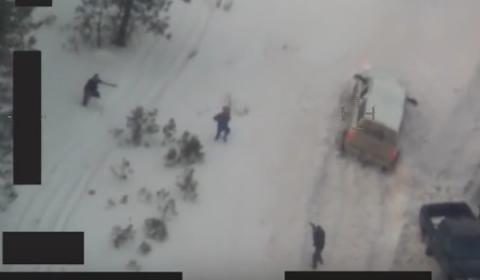Double Standards & Special Pleas: What Oregon Says About America
Jan 30,2016
A man is confronted by law enforcement officers in the midst of an already-tense climate. After his initial interaction with the officers', the man, for whatever reason, tries to flee. Unsurprisingly, the police pursue him, eventually catching up with the man and shooting him, sparking a nation-wide uproar.
Now, chances are you've already started forming in your mind a particular picture of the events I just described, filling in the blanks as you see fit. You probably already have an idea of who the man was, what he looked like and, more importantly, whether the law enforcement agents involved were justified in shooting him. Sure, your ideas are almost exclusively informed by your political prejudices (and in some regrettable cases, other kinds), whatever they are, but hey, you've got an idea, and that's all that matters, isn't it?
Well, before you get too set in your preconception of the above scenario, let me tell you about the man shot and killed by law enforcement that day. The man was a rancher by the name of Robert LaVoy Finicum. A white, 55 year-old rancher at that.
Taking part in the anti-government protest and subsequent occupation of the Malheur Wildlife Refuge in Oregon, Finicum and some of his fellow militants were intercepted by the FBI and state police on their way to town. They were driving down the road when they were forced to halt at a police checkpoint before suddenly resuming their drive. They didn't get very far though, as a roadblock inhibited further movement and caused Finicum to bank to the snow-covered side of the road, nearly hitting a police officer who, as seen on video footage released by the FBI, inexplicably seems to jump in front of the vehicle. Complying with orders to exit the vehicle and contrary to early reports that he charged at police, Finicum steps out of the vehicle with his hands raised in the air, trudging through the snow as armed officers surround him. At one point, he makes an awkward movement that officials insist was an attempt to reach for a gun he had in his coat pocket. This was the moment that the surrounding officers fired upon him, knocking the 55 year-old over and leaving him motionless on the floor without bothering to disarm the allegedly-violent suspect, much less get him medical attention. Why would Finicum wait until he was surrounded by armed law enforcement agents on inhospitable terrain to reach for an inconveniently placed firearm? Good question, but it's highly unlikely the FBI will be answering it any time soon.
Normally, when news of law enforcement shooting people under circumstances makes the rounds, the left side of the political aisle is spouting off about police militarization, mass incarceration, and the need for progressive-minded activists to reform an unfair criminal justice system, while the right side is telling tales of a "war" on law enforcement, hordes of amoral thugs running rampant in American cities, and an excessively-lenient judicial system that makes the aforementioned travesties possible. This time around however, the roles appear to have switched: as liberals shriek about the quote-un-quote imminent threat posed to America by heavily-armed militia groups, anti-government extremists and right-wing "terrorists", conservatives decry an intrusive government that threatens the rights of liberty-loving Americans with jackbooted federal agents ready to confiscate their guns and kill anybody foolhardy enough to resist. What I wonder is, what explains this massive shift in narratives? Or to put it another way, why do a disturbingly-noteworthy amount of liberals celebrate the death of Robert Finicum at the hands of law enforcement, but not that of Eric Garner? Similarly, why do conservatives receive the old rancher as a martyr, but 12 year-old Tamir Rice as a criminal? Why does the left perceive MOVE as an example of police brutality but not Waco? And why does the right remember Ruby Ridge, but not Kent State?
The reason, in this author's humble opinion, is what William Norman Grigg refers to as "situational Leninism". Inspired by Russian communist revolutionary Vladimir Lenin's observation that the underlying basis of political organization is "Who does what what to Whom", the situational Leninist bases their evaluation of the appropriateness of a violent incident involving law enforcement not by whether their response was proportionate or even whether the targeted party is guilty or not but by what "group" said party belongs to. Thus the same people who tweet BlackLivesMatter are able to call for drone strikes to take out the rest of Finicum's companions, and the ones who are demanding that FBI Special Agent Gregory T. Bretzig be charged and imprisoned over the bureau's conduct in Oregon can vigorously defend NYPD officer Daniel Pantaleo's actions in the Eric Garner case in the same breath. There is a term for this. It's called cognitive dissonance, and as you can tell, it is very widespread among Americans on both sides of the political spectrum.
For those who are genuinely concerned about the draconian nature of policing in America today, this is no doubt a source of great frustration. After all, how can anyone claim to be for justice when they make exceptions for people they despise? If I may return to Mr. Grigg's thoughts on the subject, until we stop basing our sympathy for victims of police violence on who the "Who" and "Whom" are, then we will continue to see the "what" - that is, overly-violent law enforcement - in years to come.






